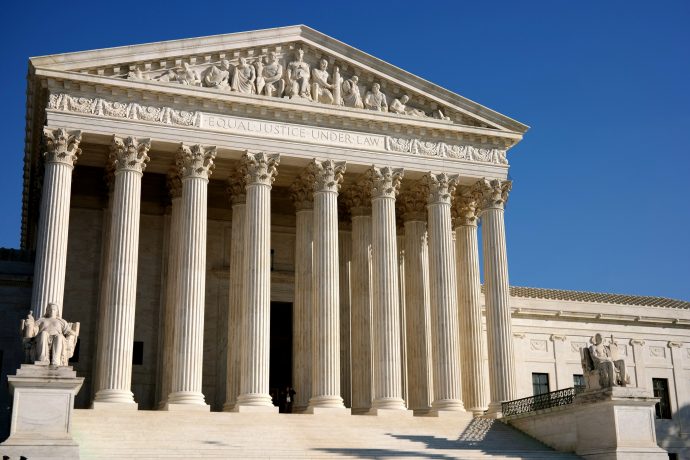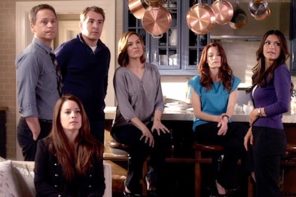For LGBT legal nerds like me, June 26 is an important day. Every major pro-equality decision handed down by the U.S. Supreme Court in the past 15 years has been issued on June 26. From the decimation of anti-sodomy laws in Lawrence v. Texas in 2003, to the affirmation of our constitutional right to marry someone of the same sex in Obergefell v. Hodges in 2015, this “Decision Day” at the end of the court’s term has frequently signaled a leap forward for the legal equality of LGBT Americans.
And in some ways, June 26, 2017 is upholding that tradition: the Supreme Court today reversed a ruling from the Arkansas Supreme Court that treated same-sex married parents differently than opposite-sex parents. The court’s summary reversal in Pavan v. Smith pointed to its own ruling in Obergefell, reaffirming that married same-sex parents must both be listed on the birth certificate of a child born to that couple, regardless of the methods used to conceive, or the biological relationship (or lack thereof) each spouse may have to the child. Crucially, though, three of the court’s most conservative justices—including newcomer Neil Gorsuch—dissented in the reversal, suggesting that nationwide marriage equality and its attendant rights and privileges could be more precarious than any of us would like to admit.
Arkansas anti-gay dissent, by Gorsuch is grotesque. And reason SCOTUS taking up Colorado cake case is clearly Gorsuch. As I wrote in March: https://t.co/OWod6A38hx
— Michelangelo Signorile (@MSignorile) June 26, 2017
This disconcerting complication functions well as a microcosm of what the Supreme Court actually did on this particular “Decision Day.” Bolstering speculation that the high court may not be done considering marriage equality, the court also announced today that it will hear a controversial case out of Colorado, where a baker refused to make a wedding cake for a gay couple, claiming that his religious views exempted him from longstanding statewide nondiscrimination law. The plaintiff, Jack Phillips of Masterpiece Cakeshop in Lakewood, Colorado, has been rebuffed by every court and commission that has heard his case thus far. Even his attorney at Alliance Defending Freedom was surprised that SCOTUS agreed to hear the case, according to BuzzFeed. Nevertheless, ADF’s Kristen Waggoner was quick to tell BuzzFeed she was hopeful that Masterpiece Cakeshop v. Colorado Civil Rights Commission would ultimately help ensure “that Americans with a different viewpoint on marriage wouldn’t be forced to express messages they disagree with.”
But that wasn’t even the clearest signal the high court gave today that it’s ready to reconsider the weight granted to legal claims of “religious freedom.” In a not-unexpected decision issued today in favor of Trinity Lutheran Church in Columbus, Missouri, seven justices concluded that a state program that reimbursed organizations which used scrap tire rubber to resurface playgrounds, but denied those grants to religious institutions, violated the Free Exercise Clause of the First Amendment. The ruling itself, written by Chief Justice Thomas Roberts, has some unusual partial concurrences, including a footnote that Justices Gorsuch and Clarence Thomas refused to join. BuzzFeed‘s Chris Geidner has an excellent parsing of the decision in its entirety.
As I’ve previously unpacked here at RD, the facts of the Trinity Lutheran are deceptively simple, but the constitutional issues raised by the case—and now by the decision—are complex, and have the potential to further dismantle the proverbial wall separating church and state. We’ll have more on the implications of Trinity Lutheran later this week, but for now, Freedom From Religion Foundation attorney Andrew Seidel offered a pointed explanation of the slippery slope SCOTUS has placed the country on:
Some initial thoughts on the terrible SCOTUS decision in #TrinityLutheran. This is a sad day for the First Amendment. pic.twitter.com/VpEgYkweUu
— Andrew Seidel (@AndrewLSeidel) June 26, 2017
While the most immediate implications of Trinity Lutheran likely have to do with government funding for parochial school vouchers—a function Education Secretary Betsy DeVos has long supported—even that change may hit LGBT Americans harder. Remember that DeVos has perpetually failed to identify a single discriminatory action that would, in her mind, make a private or parochial school ineligible for federal funds; it’s no massive leap to assume that blind spot for discrimination is even larger when it’s justified by a “sincerely held religious belief.”





